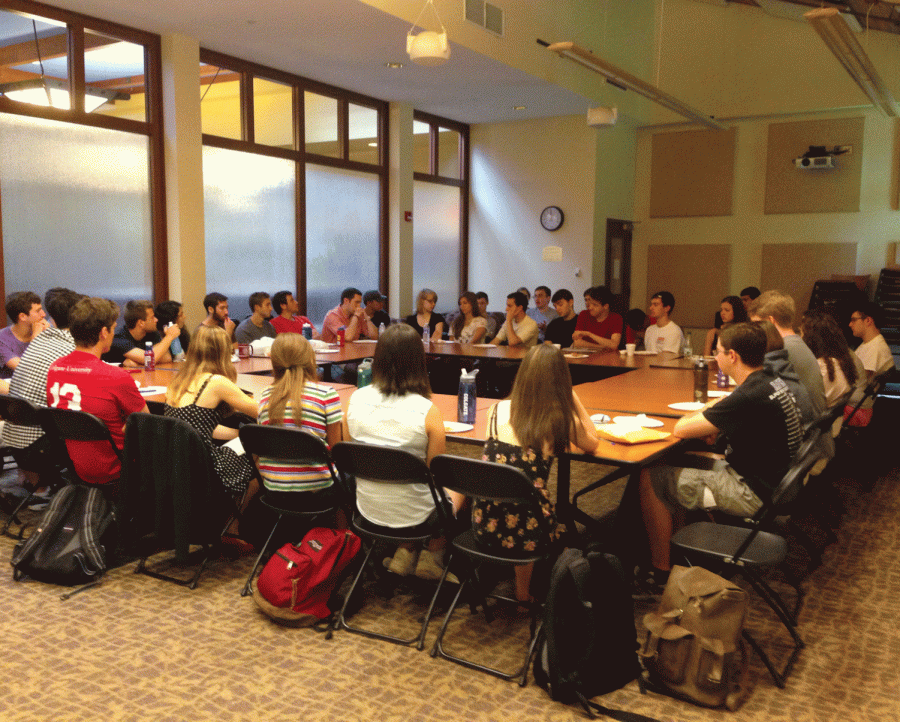Students Host Forum on Middle Eastern Conflicts
Colgate students convened at the O’Connor Campus Center on September 4 to participate in an open forum on conflict in the Middle East. The event, which was organized by the Israeli Culture Club in partnership with the College Democrats and College Republicans, focused on recent developments in the Gaza Strip and the spread of the Islamic State in Iraq and Syria (ISIS).
The forum began with discussion about Gaza. Tensions between Israel and Hamas, a Palestinian-Islamic militant group that controls most of Gaza, have flared since June when Palestinian adults abducted and murdered three Israeli teenagers. Less than a month later, in an apparent act of revenge, three Israeli citizens kidnapped and murdered a young Palestinian man. The two sides have engaged in rocket fire ever since. According to The New York Times, nearly 2,200 people were killed between early July and late August; a large percentage of those were Palestinian civilians.
Conflict between Israel and Palestine is not new, but the events of the past few months–and particularly the high civilian death toll–have reinforced the importance of a peaceful settlement in Gaza. Students at Thursday’s forum voiced a broad range of opinions, but a few key points emerged; students were vocal supporters of the “two-state solution.” However, this proposal has proven difficult to implement as it would
solidify Palestinian state sovereignty and would require significant concessions from both sides.
Several students argued that Hamas (as a state government) ought to be viewed with more legitimacy, a position that has garnered mixed responses. Some said Hamas was elected by the Palestinian people and should therefore be seen as legitimate; others countered that those elections were corrupt and that Hamas’ history of terrorism should undermine its sovereign legitimacy. One participant pointed out that the very question of Hamas’ legitimacy was part of an overarching issue, arguing that the chaotic nature of the region makes it very difficult to define state borders and identify state governments, which further complicates peace talks.
The forum then shifted to ISIS, an Islamic militant group which aims to establish a Muslim caliphate in Iraq and Syria. ISIS has quickly taken control of cities, villages, oil fields, dams, infrastructure and even major banks, and has established control over wide swaths of territory. Its violent techniques–including crucifixion, abduction, torture and rape, as well as the beheadings that have been filmed and posted to YouTube–have horrified the world and prompted a limited military
response from the U.S. government.
Last week’s discussion was framed by the question “Does the spread of ISIS constitute a threat to U.S. national security?” Many students opined strongly that ISIS poses a real threat and argued that President Barack Obama has little choice but to get involved.
Others countered that the significant obstacles to democracy in the Middle East,
including the region’s theocratic history and vast diversity, doom American involvement in
Middle Eastern wars.
The ISIS discussion covered a surprisingly broad range of subjects: students debated the legitimacy of dictatorships, the role of Iran in combatting ISIS, the role of Kurds and other topics.
One student noted the role of President Obama’s legacy; as she pointed out, entangling our nation in yet another foreign war would diminish President Obama’s other initiatives and would be a cornerstone of his remembrance, something he
likely opposes.
President of the Israeli Culture Club junior Adam Basciano was effusive in his assessment of the forum.
“[Right now is a] fascinating, once-in-a-century moment in time to be analyzing the current events of the Middle East,” Basciano said. “We truly are fortunate to be surrounded by so many educated students and professors … who are willing and eager to come together to discuss difficult topics.”
President of the College Democrats junior Nick Friedman was satisfied by the forum’s success, saying that the forum’s goal of facilitating an open, level-headed discussion
was accomplished.
President of the College Republicans senior Brandon Zaccardo was particularly impressed by the quality of debate.
“Today’s forum demonstrated that a lot of students – all with different views – care deeply about bipartisanship. People with widely different political views saw the importance of good debate, and I think that working towards bipartisanship is a really worthwhile goal,” Zaccardo said.







